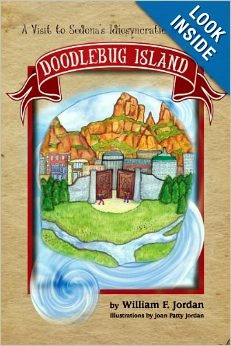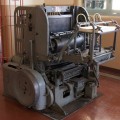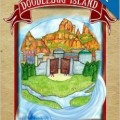No News Is Good News…by William F Jordan

Doodlebug Island resident, Amos Huxley, has often described himself as being born out of time. But this is hard to comprehend given the fact he is a strong believer in the idea of reincarnation and that he is a current iteration of someone who has had a foot in every age since Neanderthal! Time, it would appear, could have little to do with it.
“What I mean is that I think I was best suited for the fifteenth century. Modern life is too pedantic, too organized, too bureaucratic. Give me the merry making, the jousting, the knightly questing when Henry the IV was on the throne and we strove to bring about a just and happy world through our gallant and manly conduct.”
And perhaps Amos did arrive in this century with vestiges of some former time clinging to him, for his conversation sometimes rings with expressions common to another age. Although interspersed with modern vernacular, words like ‘varlet,’ ‘knave,’ ’rent asunder,’ and ‘methinks’ roll off his tongue with an unconscious ease, and at times there is a colloquial quality to his speech. “Canst thou not refrain from making a fool of thyself?” he might be heard to ask one or another of his tormentors. “A worse set of blaggards ne’er set foot on this Island.”
Many of those tormentors are members of the road crew of which Amos forms a part, and together they keep Doodlebug Island streets, alleys, and lanes in good repair. These same jokesters sometimes amuse themselves by putting speed bumps or drainage depressions in front of peoples’ houses, whereupon they wait for the inevitable complaint to work its way through channels before they remove the impediment altogether, or move it to another spot just as irritating. But their favorite source of amusement centers around Amos and his unshakable conviction regarding reincarnation.
“Were you Amos Huxley back in Henry’s day, or could your name have more properly been Amos Huckster?”
“Belay such scurvy talk, varlet, on pain of suffering shovel marks on thy backside!”
Always in question is whether Amos really is a product of the past, bringing more ancient forms of expression with him, or if he merely affects such language much as an actor dons a costume for a part.
“You sound more like a common seaman of the whaling period than a Medieval holdover.”
“As if thy meager understanding could encompass anything greater than what constitutes a pinter if soil or a yard of concrete! Thy brain is more of a let than a help.”
“Is more of a what?”
“A let! Bodkins, man, knowest thee nothing? A ‘let’ is the name for a gate.
Swinging both ways, it stops or allows as might be required. Today, the word retains but the permissive quality to which it once referred.”
“You know, Amos, someone wrote about a free verse poet who, when he reincarnated, came back as a cockroach. That possibility appeal to you on any level?”
“Form matters little, my quintessential travesty of miscreant knavery. It is what one learns from his experiences that counts! The cockroach to which you refer was named ‘Archie’, and his philosophical observations inform the world.”
“Well then, what can we learn from someone who spent his time in a tin can clanking around the English countryside waiting for the opportunity to play Don Quixote?”
“You? Nothing. Others might hasten to discover merit in silence, beauty in observation, wisdom in thought.”
“Poetical, but hardly earth shattering. Surely, anyone who has lived so many times before has an observation that would help us be better people.”
“Archie said it best, ‘Yesterday, scepters and crowns; today, I consort with bums, wotthehell.’ If I appear to be nostalgic for the past, it may be because the feudal system, difficult as it may have been, was simpler. Today, mankind places itself on creation’s throne, and labors to establish order from chaos, principles from ambiguity, and, finally,
to separate the finite from the infinite. Knowing this may not make you better persons; in fact, I suspect you’ll think I’m talking nonsense, but that’s my summation.”
“We only asked for a small geyser, not a full eruption. Maybe we’ll have to be born a few hundred more time to learn what you’re talking about, and by then we might have our own incarnation stories.”
“No doubt. Now, I suggest that we demonstrate some proclivity regarding work and move this decomposed granite into yon void.”




